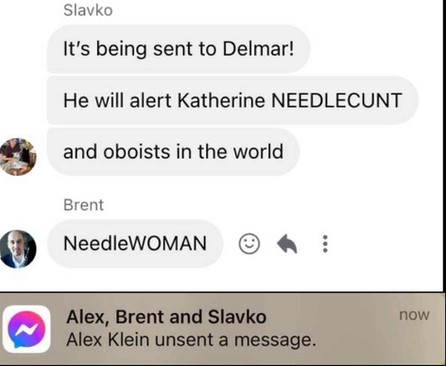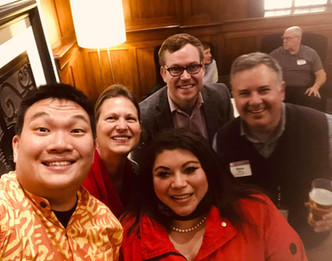Standing Up for Integrity in Classical Music — Why I Left the Seattle Symphony, Spoke Up About Alex Klein, and Supported the Calgary Philharmonic Orchestra Investigation
- Katie A. Berglof

- Jan 2, 2025
- 22 min read
Updated: Oct 27, 2025

This isn’t just about one individual, it’s about dismantling a culture that allows abuse to persist in classical music institutions. My decision to leave the Seattle Symphony was rooted in my unwavering belief in integrity and accountability — qualities that often clash with the politics of self-preservation in large institutions.
Institutions must stop using the loopholes in policies to silence whistleblowers and shielding harmful behavior, even if it's in another orchestra. Change starts when we choose courage over silence, even when it comes at a personal cost.
One of the defining catalysts for my departure was a troubling series of interactions with a legendary oboist named Alex Klein in the Calgary Philharmonic.
The first instance came after James Levine’s passing was announced. Alex shared a social media post glorifying Levine, ignoring his history of sexual abuse. When asked politely by commentors to remove it out of respect for the victims, he got offended and started accusing them of public shaming. His defense revealed his deep-seated denial of systemic issues.
However, after I posted a statement about being disappointed in musicians who were praising Levine, he wrote to inform me that he removed his post; stating that he was not aware Levine raped anyone, and that it was his understanding that Levine had consensual sex with minors, that it still counted as statutory rape, and that Levine did it [in exchange] for professional favors. I tried to explain what grooming was, but he dismissed everything I said. See photos of part of our conversation below. Note: If photos do not expand when clicked on, clear your cache/cookies or history.
Our second interaction, in person, was more concerning. For some reason he brought up the subject of teacher-student affairs again when I visited him during the Bellingham Symphony Festival. He openly condoned inappropriate relationships between music faculty and students at his festival FEMUSC - Festival de Música de Santa Catarina, claiming such dynamics were “natural” in Brazil and acceptable if consensual. He said he would not reprimand his music staff for what went on behind closed doors. I disagreed, but he talked right over me.
I am not the only one he's shared these deeply concerning views with.
“He seems to have some sort of fixation on this topic, as when I was a student of his he strongly encouraged me to go to bed with whomever whenever to advance my oboe career. ‘Jacqueline du Pré slept with Rostropovich to get where she got,’ was some of his sage advice.” - Stina Drogovich Peña
Please see photos below of former students and musicians public statements. Note: If photos do not expand when clicked on, clear your cache/cookies or history.
Several months later Alex left Facebook after noting he felt the woke #metoo movement had gone too far. He sent me his contact information if I ever needed to write. I took this as him taking a social media break. After more than a year had gone by, I reached out to Alex via email to connect him with a hand dystonia researcher that wanted to get in touch with him. My email was friendly and cordial. I noted that I had missed seeing him online and wished his family well. His reply to me was unexpected and unrelated to dystonia. Instead, he sent a lengthy email containing defamatory statements about colleagues, former students, and myself. The content of his response was unsolicited and entirely outside the scope of my outreach.
In his reply, Alex detailed accusations against two of his former students: student #1 and student #2 (names redacted in my public writing for privacy). He claimed that #1 had fabricated an affair and shared altered screenshots online to make it look legitimate, and that #2, another former student who he hired on at DePaul, tried to report him on #1 student’s behalf.
Alex stated that when #2 confronted him, he threatened to report her to the Dean of DePaul University for being racist and attempting to get a minority professor fired. He stated that she resigned from her position and left DePaul soon after.
He also falsely accused me of interacting online with student #1, specifically claiming I liked or commented in support on one of her posts (when I did not know the student and have not seen their name before. I also did not know student #2 and have not seen their name before). I asked him twice for screenshots or any proof of me interacting with student #1 post, which he could not provide. He said he had saved them somewhere but failed to produce them. In the same email, Alex made several misogynistic and defamatory remarks about oboist Katherine Needleman. He accused her of racism, disparaged her professional qualifications, and made crude insinuations about how she obtained her position. He used degrading terms including “queen of filth”.
See photos of email conversation below.
I felt like I was experiencing DARVO, which is a manipulation strategy/tactic and acronym that means: Deny, Attack, Reverse Victim, and Offend......except I had never confronted him about misconduct allegations when I reached out to him about focal hand dystonia. His reaction was unsolicited. I think he was projecting his anger onto me that he felt towards his students and towards Katherine Needleman. He felt the need to take it out on someone, and that person was me.
I've added some more information on DARVO below:
Over time, I realized Alex Klein's behavior overstepped my boundaries and was deeply hurtful and concerning, and I regretted not recognizing the red flags sooner. I had considered him a friend since we related over having a disabling disorder called musicians’ dystonia, but his distorted views on sexism and approval of sexual affairs with students made it clear he was unfit to oversee any program, especially involving young students.
Around the same time I came across The Guardian article covering the 'open secret' of sexual abuse in El Sistema Venezuela written by Geoff Baker, where violinist Luigi Mazzocchi affirmed that teacher-student relationships were “the norm" in their country, and teachers would actually say it out loud: ‘I do this [have sexual relationships] with my students because I think we’re actually helping them become better musicians, better violinists.’"
I thought about what Alex said about approving student-teacher relationships at FEMUSC, which is also an El Sistema-inspired organization. Then I thought about his former music students from DePaul who tried to report him, and wondered where they were or what they were doing. I tried to find them online and had no success which made me even more worried. It was as if they were nonexistent or disappeared.
This lead me to oboist and advocate Katherine Needleman. I am not an oboe player or professional, and I don't have connections like she does in the oboe world. I asked if she knew the students mentioned in Alex's email or their whereabouts. I also showed her the messages Alex wrote about her, including calling her a “Queen of Filth”. I felt she had every right to know about the defamatory remarks he was making about her.
Katherine later shared a redacted excerpt of the email on Facebook (specifically just the section of the email defaming her). She did not name Alex Klein but simply noted that someone had attempted to discourage a young lady from following her work. Due to a reference to focal dystonia in the email text, many inferred that Alex was the author.
After Katherine’s post gained traction, Alex emailed her claiming he did not write the email to me, and instead alleged that Brent Hages (an oboist who subbed with the Calgary Phil) and Slavko Popovic (who was principal clarinet with the Calgary Phil at the time) hacked his email account and wrote those messages about her. He sent her screenshots of them speaking about her in derogatory terms in a Facebook chat, using gender slurs.
Katherine and I did not find this explanation credible. The subject, style, and tone of the email clearly matched Alex’s voice and erratic writing used consistently throughout the email thread. Also as you can see from his full email thread, he consistently wrote defamatory remarks about Katherine alongside his statements about his students, using the same degrading remarks towards all three of them, such as calling them racist and stalkers.
Also, the screenshot messages he forwarded to Katherine of Brent and Slavko degrading her are clearly from a social media inbox/app conversation (with the colored squares highlighting each person's message), and the messages Alex sent to me about Katherine and his students were over email.
Katherine and I also noticed that he hadn't reported Brent or Slavko's unprofessional behavior to the Calgary Phil, which is what he would have done if he truly did not support gender slandering (i.e. calling Katherine a cunt). The Calgary Phil has a code of conduct policy requiring musicians to act professionally and not to speak ill or make defamatory remarks about other professional musicians. Brent and Slavko clearly would have been reprimanded long ago if Alex had reported them for breaking this policy.
Katherine mentions how Alex conveniently deleted his own conversations from these facebook message images below that he sent her.
Also, not long after Katherine shared a redacted excerpt of the "queen of filth" email on her page, I was contacted by Mark Stevens, CEO of the Calgary Philharmonic Orchestra, and by an external investigator hired to conduct a formal investigation into Alex Klein’s conduct. They asked me to participate based on the information I had received.
Again, I initially hesitated to get involved due to a sense of loyalty to Alex. I was being asked to make an extremely hard decision, and this challeneged me to internally reflect and assess if I was honoring my values and principles, or if I was prioritizing loyalty to a person or an institution over them. Integrity means doing the right thing, even if that choice is not easy. Furthermore, I was privately contacted by some Calgary Philharmonic musicians who urged me to help. They indicated that Alex had already previously been the subject of internal formal complaints for racist and inappropriate comments, including sexual remarks made to at least one female colleague, and that he had undergone disciplinary training in the past.
After hearing this, I chose to do what I believe was morally right. I agreed to cooperate with the investigation and was formally interviewed by the external investigator. I provided all of the original email messages that Alex sent me and shared a factual account of my experience, including dates, times, etc. I was not asked questions in regard to Slavko or Brent.
I want to mention some things that I did not know about Slavko or Brent until after the investigation was over though:
Slavko Popovic has been investigated for racist remarks in the past, as this was not the first time musicians have called out the Calgary Philharmonic on Popovic's racist remarks publically. In that case it was the IG account #orchestraisracist that called on the Calgary Phil to investigate Popkovic in 2020.
Brent Hages, who still plays in the Yakima Symphony Orchestra in Washington state is accused of being involved in a federal hate crime.
At the conclusion of the investigation, the Calgary Philharmonic fired both Alex Klein and Slavko Popovic. Alex Klein was also removed from DePaul's faculty listing online for unknown reasons. I had no idea what to think of all of this since it happened in the blink of an eye. All I knew was that I was saddened that someone I once highly thought of as a friend would act out this way in an abusive and bullying behavior towards me and other women. I was glad to see the investigation over with.

However, my involvement in the Calgary Philharmonic investigation came at a personal cost.
My own workplace, the Seattle Symphony, suspended me and issued a final warning, citing a breach of digital policy because Alex Klein’s “Queen of Filth” email had been sent to my work email account and not my personal email.
Despite my concern for his students and Calgary Phil colleagues, my own HR department saw me as a potential lawsuit that could bring negative attention to the Seattle Symphony.
They will claim I left voluntarily, but I felt forced out. I knew they saw me as nothing but a liability after this disciplinary action, especially after a third-party HR coach was brought in to “help” me without my consent and mostly criticized me for putting the organization in a vulnerable position, which of course was never my intention. I was called a bad employee, told I majorly f**cked up, that there were board members that wanted me fired, and that I was not cut out for this field.
After resigning a few weeks later and leaving the Seattle Symphony two days before my 40th birthday, I accepted an HR job closer to home, but the stress and depression from all the prior events took their toll on me.

Losing my dream job was as devastating as it was when I was diagnosed with musicians' dystonia — reliving a second loss of a lifelong dream all over again. It was traumatic and it happened so quickly and out of control, I had no time to process it.
Even though my job was an administrative role and paid very little, I was happy to find a way to continue supporting musicians, and I was one of the staff that brought diversity to the organization. I was grateful to have served in various roles at the Seattle Symphony from Office Administrator, to Office Assistant & COVID Coordinator, Interim Executive Assistant to the President & CEO, and Development Intern. I helped proctor five auditions for the Seattle Symphony, and was a representative for the SSO on the Northwest Orchestra Gathering steering committee. I earned my DEI certification and took additional HR courses and credits after the VP of HR (Paul Johnson) informed me that our CEO (Krishna Thiagarajan) planned on opening up a DEI coordinator or DEI manager position in our department. I expressed my interest in applying for the position since I am passionate about this area. I even turned down other departments and organizations recruiting me. The VP of Education and Community Engagement (Jeremy Jolley) had asked me directly two separate times if I was interested in applying for positions open in his department due to my prior background experience in Outreach and Education. Byron Schenkman & Friends (now called Sound Salon) asked if I was interested in applying for their Executive Director position when it opened up since I had helped support their work. Multiple staff encouraged me to apply for the Executive Assistant position I was standing in for briefly, stating it would be a good opportunity. But, I made the decision to hold off from switching roles or institutions in the hope that I could serve in a DEI manager/coordinator role within my own department. But of course, those positions never came into existence.
I put my best foot forward as an ambassador since my role as their Office Administrator in People & Culture/HR connected everyone across the organization. I put my whole heart into my work and I loved getting to know everyone and enjoyed supporting them and making them smile every day. I truly cared for my colleagues like family. I was able to see how a professional orchestra nonprofit functions from a birdseye view, which I was grateful for because I wanted to start my own nonprofit someday to continue supporting musicians.
It hurt to walk away. And it still hurts.....but I am not willing to sacrfice my morals and humanity over a company.

After leaving, I learned that I was not alone. A handful of former Seattle Symphony staff and musicians reached out to me who were terminated (recently and in the past) allegedly without justified cause (i.e., meaning there was no performance review track record or disciplinary actions that led up to their termination). This means the company likely used At-Will Employment to fire them.
From an HR perspective, this often happens when companies want to downsize or save on budget. They fire people and keep it silent, giving the person a severance paycheck and granting them unemployment while hoping the terminated employee won't speak out or have a chance to speak with their colleagues about what happened to them. This process is often used as a convenient loophole for companies to remove employees without explicitly stating performance-related reasons, especially in cases where management holds personal biases against certain staff members or perceives them as a threat. These situations can arise when a manager feels intimidated by an employee's skills, experience, or popularity among colleagues, viewing them as competition rather than an asset to the team.
By framing the termination as a business decision (citing downsizing, budget constraints, or restructuring) management can mask the true motives behind the dismissal. This strategy enables companies to sidestep legal risks associated with wrongful termination claims by offering severance packages and granting access to unemployment benefits. These gestures are often presented as a goodwill effort, but they primarily serve to discourage the terminated employee from taking legal action or airing grievances publicly.
Moreover, the hush-hush nature of such terminations benefits companies by preventing disruption to team morale and maintaining control of the narrative. Employees left behind often don’t receive clear explanations, fostering confusion and fear rather than solidarity. Without transparency, colleagues may hesitate to ask questions, fearing their own job security. This lack of communication leaves terminated employees isolated, unable to advocate for themselves or uncover patterns of potential bias, favoritism, or unjust practices.
In essence, this approach allows management to discreetly remove individuals they simply don't like without addressing the deeper, systemic issues in the workplace culture. It reflects a misuse of power, prioritizing personal preferences or insecurities over fairness, accountability, and the value of diverse perspectives and talents within the organization.
Out of the handful of people who reached out to me, at least four of them, including myself, who were pushed out and/or fired were of color, and three were women. The hypocrisy of an organization that claims to value staff, embraces diversity and inclusion, has a Chief Diversity Officer (who oversees staff retention, fair and equal practices, and oversees the People & Culture/HR department), and provides DEI roundtables for staff and musicians.......was glaring.
My fired colleagues experiences, although not related to my situation, were harrowing, stating that they were abruptly told their positions were terminated, and then escorted directly off the property without any notice or chance to say goodbye to their friends and colleagues.
This gives off the impression that leadership and HR does not care that the staff are equally and deeply invested in the mission and organization as much as the musicians.
If they did care about the people who work for the Seattle Symphony, they wouldn't blindside staff when terminating them in this disrespectful, cold, inhumane, and cruel manner.

I lost complete faith in the President & CEO Krishna Thiagarajan (whom I briefly Interim Executive Assisted without executive pay in 2022) and my former department (People & Culture/HR: Paul Johnson and Daniel Ecklor) after I heard about these silent terminations. I saw how deeply hurt and betrayed these staff and musicians felt, and how much it negatively impacted their lives with long-lasting repercussions.
I was especially disheartned because I had written to the President & CEO (Krishna Thiagarajan) in my exit interview about the organization needing a Chief of Staff to provide better accountability over HR, Vice Presidents, and middle managers handling of direct reports and grievances.
A Chief of Staff helps address problems with proactivity, rather than reactivity when major grievances or even situations such as mine arise.
When management and especially HR is too busy protecting the company, the staff need someone they can trust standing by them and whom they can go to without fear of being fired, silenced, penalized, or met with complete disregard, criticism, or apathy.
I also want to mention here another common practice that is used in other organizations to silence others who bring up major grievances, is the use of non-disclosure agreements (NDAs or CDAs) or proprietary information agreements (PIAs). There are countless cases in music schools and music institutions that go unheard of due to the use of these to silence people from speaking out, just like in Cara Kizer's case.
Staff who work under the Seattle Symphony leadership carry out the logistics of the mission of the nonprofit organization. The fact that the SSO easily tosses out the staff who serve their mission in this cruel method of silent termination speaks volumes about the toxic culture that still exists and is perpetuated by leadership. Nonprofits should never be treated like they are large corporations like Boeing where people are treated like numbers.
It doesn't help that the VP of People & Culture and Chief Diveristy Officer, Paul Johnson comes from a corporate background working in HR leadership for Boeing and Starbucks, and the HR manager, Daniel Ecklor does not come from a nonprofit background or music background either. Daniel's approach to handling staff grievances is cold, dismissive, deflective, and undermining.
It's the CEO's job to ensure management (like HR) does not abuse their power. But I feel he hasn't protected the staff and musicians in the way that they deserve. HR, by design, exists to protect the organization, not the employees. Similarly, the CEO’s primary responsibility is to safeguard the organization, which often means they defer to HR’s decisions and rarely question their motives and blindly trust that their leadership team is treating staff fairly. I've also seen this reflected through the VP of Marketing, Christy Wood, when it comes to over-monitoring staff's social media and intimidating staff directly, while using the excuse of "It's part of my job."
From my experience in HR, I’ve seen firsthand how employees are too often treated as expendable, discarded without genuine consideration for their contributions or circumstances. This disheartening reality is one of the reasons I now work as a union agent supporting another union's members. I strongly advocate for arts administrators to unionize to protect themselves and their rights.
There’s a reason HR departments frequently engage in union-busting efforts. They are trained in tactics to exploit every loophole available, often employing strategies designed to intimidate or discourage staff from organizing. These actions reinforce a power imbalance, leaving employees vulnerable.
Unionization provides a vital counterbalance, empowering workers to protect themselves and ensuring they have a voice in the workplace. This is even more important in classical music organizations that are stepped in old traditions, undermining, and politics that often make the work environment toxic for workers.
I have one more example of contradicting messages by the Seattle Symphony managment I'd like to share here, even though I know this testimony is long.
I included a photo below that the Seattle Symphony & Opera Players' Organization (i.e., the musician's union) took in solidarity with Cara Kizer. The day after it was posted on Seattle Symphony's social media, I tried to share it to the Seattle Symphony Slack Channel (an app that administration uses to communicate with everyone) to thank anyone who made this photo possible and how meaningful it was.
The VP of Marketing, Christy Wood, went to my HR manager, Daniel Ecklor, and had him delete my thank you note and photo. She stopped by my desk and informed me that the musicians were taking a risk by posing in that photo with Cara. She said that the photo would have never been published if it were not for the musicians' union pushing for it.
She said our CEO, Krishna, is very conservative and that she didn't want to cause a stir among the staff, because not everyone knows about the article about Cara and the NY Phil, and it could be troubling to them. She made it very clear that the photo represented the musicians' union support of Cara Kizer, but not managements, the board, or CEOs support. Also this is a good example of how Christy Wood overmoniters and intimidates staff from ever speaking out about anything. See photo below.

With all of this said, this entire experience has been nothing short of draining.
In the months since, I've been focused on receiving PTSD counseling, starting my classical music journal (Harpsichords & Hot Sauce), and launching the “Courage Over Silence” defense fundraising campaign which have helped me feel a sense of purpose again, and to feel like I can overcome what happened. “Courage Over Silence” raised over 5K in it's first week, and now over 10.8K. Several musicians have reached out to me with their stories, thanks, and support.
I also found some solace recently in being able to connect with one of Alex’s former students. She told me she had gone offline for a while but had returned after things began to settle down.
When I asked whether she had ever publicly shared anything about an alleged relationship with Alex, she confirmed that she had. She said she tried to speak out but Alex's wife allegedly threatened her, and that due to everything she’s been through, she doesn’t feel safe stepping forward at this time. She explained she’s focused on rebuilding her life and healing — and I fully respect that. She did not specify whether the alleged relationship was emotional, physical, or both. She thanked me for caring about her and the other student, and for supporting the musicians in the Calgary Philharmonic. I’ve also tried to contact the second student mentioned in Alex’s email.
Other musicians and/or past students have contacted me as well — individuals who say they allegedly witnessed or were subjected to Alex Klein’s bullying and degrading behavior, or who have stated they were aware of Alex's past treatment towards women. Some have begun speaking more openly online.
To be clear, this is not an attempt to accuse Alex of having an affair. I am not making legal claims beyond what is already supported by evidence or the public record. I’m simply sharing what I’ve personally experienced, what others have shared with me, and why I made the decisions that I did. This article reflects my personal perspective and understanding based on documented communication, public commentary, and lived experience.
I don’t believe I should have to justify why someone of this magnitude and level of influence with a pattern of questionable behavior combined with his unwarranted bullying behavior towards me would raise red flags. My choice to participate in the Calgary Phil investigation was based on my own lived experience.
When one person finds the courage to speak up, it allows others to come forward without fear too.
Again, I fully understand why the Seattle Symphony disciplined me for being a huge liability risk. I understand that the People & Culture/HR team (Paul Johnson and Daniel Ecklor) and President & CEO (Krishna Thiagarajan) were just doing their legal responsibility of protecting the company and following protocol.
They were just doing their jobs.
And that's all it is —“just a job"—or so we (i.e. me and other staff) have been told multiple times by Paul Johnson, "If you don't like it, you can always go somewhere else." That advice alone should show you how much he truly cares about the people who work for the Seattle Symphony.
Why care about serving the people when"it's just a job”?
Why care about changing this industry when"it's just a job”?
My work has never been "just a job" to me.
I know the President & CEO and HR were also trying to avoid being embroiled in another scandal that brought national attention like former music director Thomas Dausgaard did when he resigned and reported to The Seattle Times, “I felt personally not safe. I felt threatened.” He went on to explain that the managers allegedly tried tactics to intimidate him and that the organization became "ruled by fear."
However, I don't have that kind of influential power as Thomas Dausgaard to bring that type of national attention, I am not that important and shouldn't have been treated as such an enormous threat to the image of the Seattle Symphony.
Also my involvement with the Calgary Philharmonic investigation was solely focused on whistleblowing. Whereas Dausgaard's situation arose out of a restrained relationship with management, compacted by travel restrictions, and the board not renewing his contract.
I needed to share my story here so that I can finally move on and heal. But my testimony isn’t solely about what I went through—it’s about the need to dismantle a culture that allows abusive behavior and the silencing of whistleblowers to persist.
The Seattle Symphony CEO (Krishna Thiagarajan) and HR department (Paul Johnson and Daniel Ecklor) followed standard protocol, but the way they handled my situation still felt like retaliation for whistleblowing:
It still felt like suppression and the organization prioritizing image and reputation over serving it's own people.
It still felt like clean cut policies were used to justify treating me like I was a horrible human being.
It still felt like I was an undervalued person of color easily pushed out and not given the time of day.
It still felt like strategic and targeted punishment, especially after an additional HR coach was brought in to discipline me after I had already served my unpaid suspension and final warning.
Even throughout all the hardship and tears shed, I have no regret with the decision I made to help others, and I refuse to violate or sacrifice my morals and principles for a company and paycheck. I know I’m on the right side of history.
If anything, I hope my story sheds light on how much organizational and institutional leadership plays a role in preventing whistleblowers from doing good and speaking up.
Change starts when we choose courage over silence, even when it comes at a personal cost. I will continue to speak out, knowing that my story, and others like mine, can spark the change this industry so desperately needs.
Update May 2025: I published this personal narrative/article on New Years Eve going into 2025. A few weeks later a former SSO colleague immediately called me and informed me that they had spoken with the President & CEO (Krishna Thiagarajan) of the Seattle Symphony, and that the SSO board asked him to resign. The SSO would announce his resignation through their own PR page by the end of the week (January 17th) and state that his term would finish a few months later in May 2025. My former colleague also stated that the former Chief Diversity Officer/Vice President of HR “People & Culture” (my former department lead), Dr. Paul Johnson resigned, along with the Chief Financial Officer/Chief Operations Officer, Cheronne Wong resigned too. They did not give a reason why all three resigned, but they stated that the board mentioned something along the lines about lack of governance and oversight, high turnover, and loss of highly valuable staff (including Rob Wiseman, former Chief Advancement Officer). My former colleague told me that the CEO had told them directly that all three of them resigned from the SSO at the same time. Therefore, I found it interesting that the VP of Marketing, Christy Wood, made a statement in the Seattle Times (shortly after announcing Krishna's resignation) that Paul Johnson and Cheronne Wong were only on a leave of absence and that they were still employed. Others informed me that it was an attempt to keep things on the down-low and not draw more attention, which I could understand. A handful of news reporters reached out to me as well.
Then in May 2025 all three of their names were completely removed from the Seattle Symphony administration staff listing. In July, Cheronne made the following statement:

In September 2025, Christy Wood (VP of Marketing) was no longer listed on the administration list for unknown reasons, and her position opened for hiring. When Krishna’s resignation was announced in May, several former colleagues reached out to check in on me. I felt a mix of sadness and relief. At one time, I admired Krishna, which made the eventual fallout all the more painful. I wasn’t surprised to see Paul Johnson step away—his role had always seemed unclear, and it was difficult to understand the value of his leadership, especially given his frequent absences.
In contrast, I had hoped that Daniel Ecklor would have been offered further training and oversight, as I often witnessed a harsh and unsupportive approach to handling staff matters. His decisions seemed to lack empathy and created a cold and cruel atmosphere, especially around terminations.
I was genuinely sorry to see Cheronne Wong leave. She consistently treated me with warmth and respect, and I appreciated her steady presence.
I hope this article helps illustrate just how layered and complex institutional toxicity can be—and why accountability and oversight must extend beyond surface-level leadership. In nonprofit governance, CEOs are often trained to focus primarily on serving the board, shaping artistic vision, and cultivating external relationships. But leading a large organization also means being responsible for the internal culture and the well-being of staff at every level.
Blind trust in vice presidents, officers, or middle managers is not leadership. Responsible leadership is about ensuring that people are protected, supported, and heard. Because when accountability fails, people suffer quietly, and the field loses some of its brightest talent — valuable staff get taken advantage of, harmed, overworked, or underappreciated, and end up leaving due to a toxic culture.
Progressive branding and artistic excellence aren’t enough. Institutional integrity means transparency, oversight, and a deep, daily commitment to treating every employee with dignity.
It’s not just about what the public sees. It’s about how people are treated when no one is looking.
Courage Over Silence Campaign Fundraiser & Defense Fund:
Harpsichords & Hot Sauce Orchestra Journal:
Katherine Needleman's post from last spring:
If you are experiencing anything related to sexual harassment/assault or trying to find help, please know you are not alone, and there are places that can support and guide you. I’ve listed some resources below:
National Sexual Assault Hotline
Website: www.rainn.org
Hotline: 1-800-656-HOPE (4673)
National Domestic Violence Hotline
Website: www.thehotline.org
Hotline: 1-800-799-SAFE (7233)
Futures Without Violence
Website: www.futureswithoutviolence.org
Services: Programs to address domestic violence and sexual assault.
Love Is Respect
Website: www.loveisrespect.org
Hotline: 1-866-331-9474
Services: Support for dating abuse and unhealthy relationships
(c) Katie A. Berglof, 2024 (See: Legal Disclaimer)













































































































